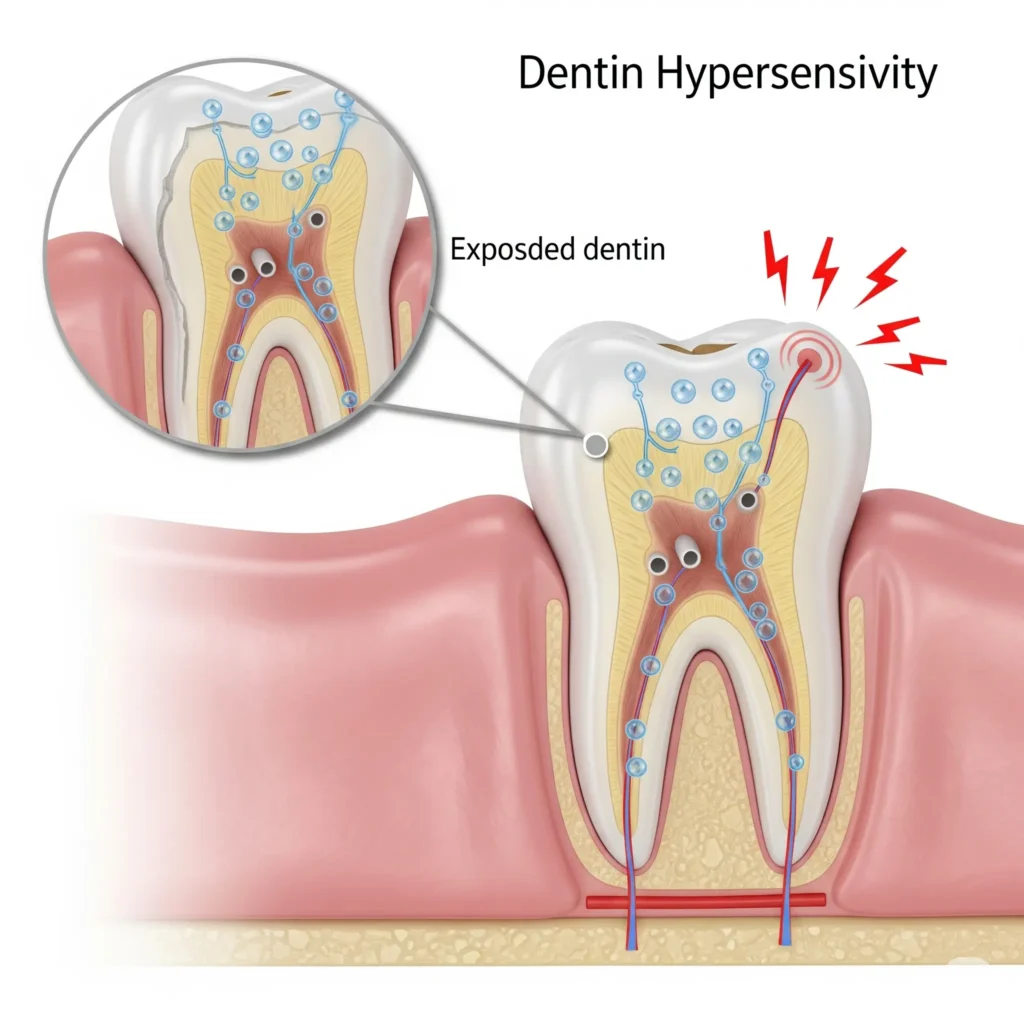Hypersensitivity dentin is a common dental condition that causes sharp pain or discomfort when teeth are exposed to specific stimuli such as cold, hot, sweet, or acidic substances. This discomfort occurs when the underlying layer of the tooth, known as dentin, becomes exposed. It can affect one or more teeth and interfere with daily activities like eating, drinking, and brushing.
Although hypersensitivity dentin is not considered a major dental issue, it significantly affects oral comfort and hygiene. Fortunately, understanding its causes and treatment options can help manage and prevent this condition effectively.
Dentin hypersensitivity occurs when the protective enamel wears down, revealing the dentin layer filled with microscopic tubules that connect to the tooth’s nerve. When external stimuli reach these nerves, it triggers pain or sensitivity. This condition is usually a response to various environmental, dietary, or behavioral factors.
Common tooth sensitivity causes include:
Since dentin exposure is the root of the problem, protecting the enamel and gums is crucial for managing sensitivity.
Identifying hypersensitivity dentin is usually straightforward. Here are some common symptoms:

Certain habits and conditions increase your chances of developing hypersensitivity dentin. Let’s explore these triggers:
1. Poor Oral Hygiene
Not brushing or flossing regularly can lead to plaque buildup, gum disease, and enamel erosion—common causes of tooth sensitivity.
2. Acidic Diet
Regular consumption of acidic foods and drinks such as citrus fruits, soda, or wine can erode enamel and expose dentin.
3. Bruxism (Teeth Grinding)
Grinding teeth, especially at night, wears down enamel, eventually exposing the dentin.
4. Receding Gums
Gum recession often results from aggressive brushing or gum disease, leading to exposed tooth roots.
By identifying and avoiding these triggers, the intensity and frequency of pain can be reduced significantly.
Wondering how to treat sensitive teeth? Thankfully, there are multiple treatment options—ranging from at-home remedies to professional dental procedures.
Home Care Solutions
Professional Dental Treatments
A consultation with a dentist will determine the best method based on your specific needs.
Preventing hypersensitivity dentin begins with maintaining strong enamel and healthy gums. Here’s how you can achieve that:
Addressing tooth sensitivity causes is just one part of long-term care. Making conscious lifestyle changes also plays a big role. Try incorporating the following:
These minor changes can help you manage hypersensitivity dentin and prevent its recurrence.
Although mild sensitivity may be manageable at home, seek professional advice if:
Early diagnosis can prevent complications and lead to faster relief.
Hypersensitivity dentin may seem like a minor inconvenience, but it can significantly affect your daily comfort and oral health. Understanding what causes it, how to treat sensitive teeth, and how to prevent enamel and gum damage is essential for maintaining a healthy smile.
Through proper oral hygiene, mindful eating habits, and regular dental care, you can manage and even reverse hypersensitivity dentin. Don’t ignore the warning signs—early intervention is the key to relief.
Mild cases may improve with good oral care and desensitizing products. However, persistent pain requires dental attention.
No. While both cause discomfort, cavities involve decay, whereas dentin hypersensitivity results from exposed dentin without decay.
It varies. Home care may show results in a few weeks. Dental treatments like bonding offer faster relief.
Yes, especially if they brush aggressively or consume excessive sugary or acidic foods.
Hyderabad : +91 6305 971445
Anantapur: +91 70758 90089
Goa: +91 83266 32500
Mon to Sat 10:00AM to 8:00PM
Sun 10:00AM to 12:00PM

Our goal is to provide friendly, caring dentistry with the highest standards in general, cosmetic, and specialist treatments. We strive to be the best dental hospital for comprehensive oral care.
We use advanced dental technology to deliver safe, precise, and painless treatments for every patient.